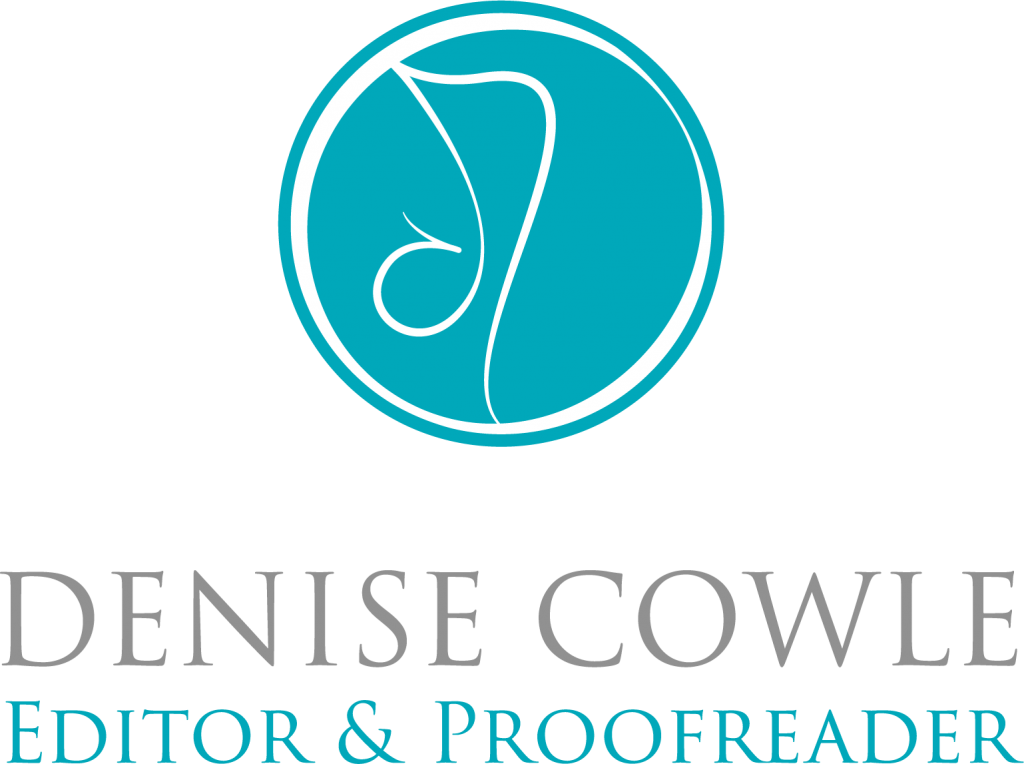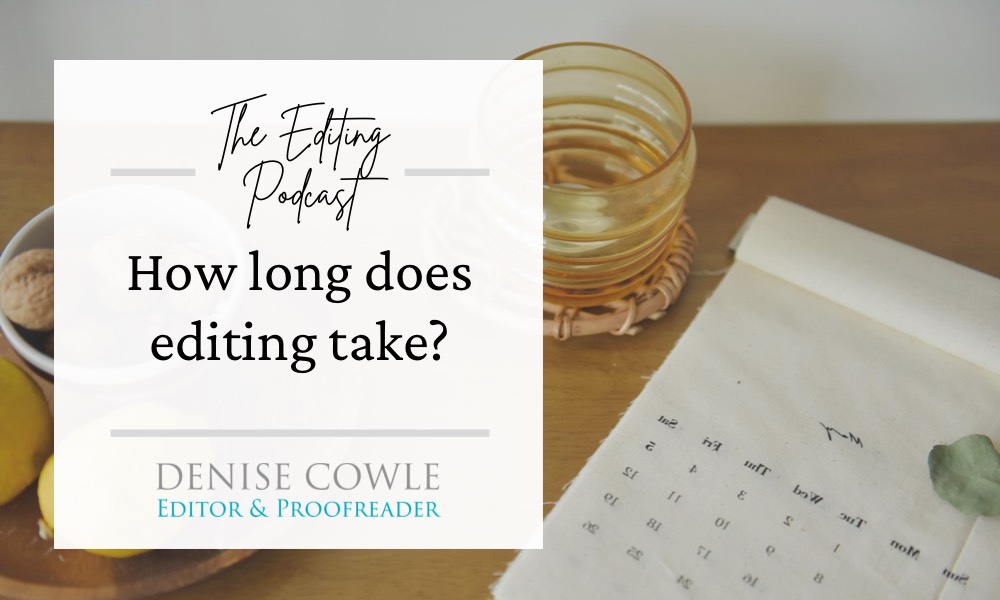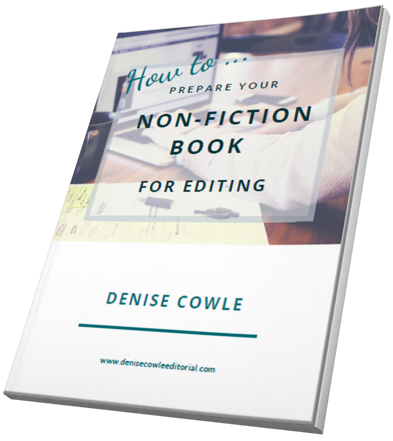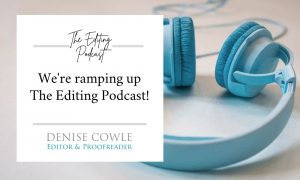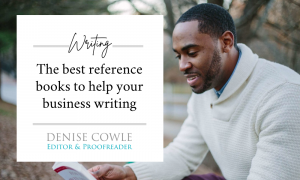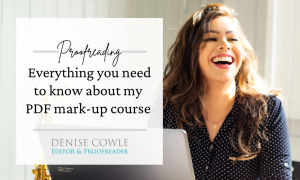In the final episode of Season 1 of The Editing Podcast, Louise and I look at how long it takes to edit a book and the factors you need to consider:
- the length of your book
- the level of editing you ask for
- perfection or good enough?
- working with a team of editors
- how long can an editor edit for?
- planning ahead for the right editor
- the follow-up work after your work has been edited.
Louise Harnby: Hello and welcome to Episode 12 of The Editing Podcast. And this is our final episode for Season 1!
Denise Cowle: I can’t believe we’ve come to the end of it.
LH: I know! The time’s flown. So talking of time, this week we’re talking about how long editing takes.
The length of your book affects how long it takes to edit
DC: We are indeed, and I think we need to think not just about how long a project actually takes to complete but how far ahead you need to think about booking help from a professional.
LH: Definitely. So the main determiner is how long the project is – well the first determiner, anyway – and that sounds obvious, but it’s a good reminder that when you’re contacting an editor, or scheduling your own editing, do so with a word count in mind. So, we’re going to talk about some of the issues that affect editing time, but it’s worth revisiting some of the ballpark timings we talked about in Episode 4 on the cost of editing.
DC: Yes, so we gave some broad figures just to give you an idea of editing speeds. So a developmental editor might manage between 250 and 1,500 words an hour. So an 80,000-word book would take anything between 53 and 320 hours. Which is why I’m not a developmental editor!
[laughter]
LH: Me neither! Imagine trying to schedule something like that! And we quoted 1,000 to 2,500 words per hour for line and copyediting. For that same 80,000-word book we’d be looking at 32 to 80 hours.
DC: Yeah – that I can cope with! And then proofreading’s more like 2,000 to 4,000 words per hour, which works out at 20 to 40 hours of work for that 80,000-word book.
LH: So it really helps if you’ve identified what kind of editing you need, and we covered this in detail in Episode 1. But following on from this is the word count. Sometimes authors have got in touch and told me they’ve got a 20-page chapter that needs editing. The problem with that is that I’ve got no idea how many words are on that page or whether that page is A4, A5, or whether the font size is 8 or 14 point, and that point size will determine what can be squeezed on a page. So our advice is to think in terms of word count rather than pages when you’re scheduling your own editing time or making initial contact with a pro editor. Now the other thing that’s crucial is the complexity of the material and what you need help with. Denise, do you want to jump in on that?
DC: Right, so there’s a massive difference between doing a final proofread for a 10,000-word brochure that’s been through three rounds of refinement where we’re just checking for any remaining spelling mistakes or punctuation problems, and a 10,000-word journal article written by an academic who’s still mastering writing in a second language. That’s going to need a much deeper level of editing and it will take a lot longer.
LH: Yes, and for me working in fiction, there are similar issues. If I’m being asked to proofread an 80,000-word mystery that’s been through five author drafts, and a round of developmental and copyediting, that’s going to be a lot quicker than if I’m doing a book with the same word count but I’m the first fresh set of eyes on the novel. The line editing’s going to be deeper and I’m going to have deal with more problems than just last-minute typo spotting. I might have to deal with viewpoint problems, or offer sentence recasts, or help the authors deal with repetition or with overwriting issues.
The level of editing you ask for will influence how long an editor takes
DC: Plus, the level of editing you’ve requested will also come into play here. So if you’re working with a developmental editor to help shape the structure of your writing, the editing might need a round of back-and-forths that take months.
LH: Yes, that 320 hours that we mentioned earlier! Whereas if you and your editor are smoothing and refining at sentence level, they’re more likely to be able to work on the full project in one hit, so that process will be more condensed. And so how long editing takes will depend on how many rounds of editing you want and what you want the editor to achieve during those.
DC: And we should mention fact-checking too – so this applies to fiction and non-fiction. If your editor needs to verify information in your writing – so I’m thinking about key dates, spellings of places and people’s names and other proper nouns – all that has to be factored in to how long the editing will actually take.
LH: And for non-fiction work, you might be checking that in-text citations match what’s in the bibliography too, won’t you, Denise?
DC: Yes, and that’s really important for academic work because poorly rendered, incorrect or missing citations or references are frowned upon at the least and can be considered plagiaristic at worst.
LH: And depending on the style guide, as I recall from doing academic editing years ago, even the way the citations are formatted is really important, isn’t it? And there are all sorts of different style guides – APA, Vancouver, Chicago, AMA, just to complicate things.
DC: That’s absolutely right, and perhaps it’s even more of an issue if the material is highly specialised, like scientific or legal writing, or writing that has legal implications.
LH: That reminds me of my husband. Johnny works in the marketing department for large insurance company, and often the thing that takes the most time is not the editing and proofreading of the words on the email campaigns. It’s the back-and-forth between the marketers and the legal compliance team, because getting that wrong could have catastrophic consequences. The other big issue that’s going to affect time is what level of quality you’re prepared to accept. Now, Denise, you wrote a really great guest blog post for me on this issue of ‘good enough’, which we’ll put in the show notes, but do you want to jump in here and talk about that?
Do you expect perfection in your edited text?
DC: Aw, thank you! Yes, so it really depends on what your goals are. And I honestly do think there are occasions when it’s OK to put out content with errors. I’m not advocating that any writer completely abandon standard grammar, spelling and punctuation, but for certain types of written content it’s just better to get it out there. So think about pieces of writing that have a short lifespan, or that are conversational or informal. And if that writing has a really high value, and your intended audience is likely to value that over perfection, good enough is what you should be aiming for.
LH: I think that’s a really good point. If you’re creating content that’s designed to make your business visible, it’s better that it’s out there and being read than sitting on your computer, awaiting perfection, because if it’s inaccessible to everyone else on the planet except you and Microsoft Word, then it’s not serving a purpose, is it? It’s not entertaining anyone, not educating anyone, not engaging anyone. It’s utterly unhelpful.
DC: That’s absolutely it. Plus, timing might be of the essence and so you might decide to invest less time in the editing process. Maybe you need to get it out in time for a specific event. If so, you might just do the best you can now so you can meet the deadline, and then revisit the editing when you have more space. Again, this always comes down to how forgiving your audience is. I would NOT recommend this approach for editors on their own content! Or anyone for whom precision in language is going to be valued highly.
LH: I think this issue of good enough comes into play in the fiction market too. So if you’re submitting to an agent, you might not need to get it absolutely perfect, with every single comma in place. Ultimately, of course, the story needs to be readable and thoroughly engaging, so rushing the developmental editing stage is not something I’d recommend. But I think authors need to think very carefully about whether every single piece of punctuation and grammar needs to be perfect if they’re trying to get representation and, ultimately, a publishing contract. Story-level quality is where the time needs to be invested.
DC: Yeah, I think that’s a great point – I think people can get really bogged down in this idea of perfection, and it does hold people back, and it’s not always necessary.
LH: Sometimes there are just diminishing marginal returns as well – you just keep trying to get perfection again and again and again, but you’re not actually moving forward.
DC: Yeah, and that has time and monetary costs as well, doesn’t it? It’s not always helpful. So, we should talk about teams, too, because sometimes a project will be time sensitive but quality will still be paramount.
LH: Yeah, so good enough won’t be enough.
Working with a team of editors
DC: Exactly. So it might be that you have a team of people who can help you with editing – perhaps your web content is verified by other people in your company, for example. But even if you’re working with third-party professional editors, if you have large files with tens of thousands of words, you might be better off working with an editing agency or an editorial collective, because then there are multiple editors who can work on the document simultaneously.
LH: Style guides can really come into play here, I think. So if consistency is important to you, and you’re working with a team, it’s essential that there’s an already-agreed set of standards about how the material’s going to be laid out, and how it’s going to be handled in terms of decisions about spelling, grammar, punctuation, numbering, capitalisation, hyphenation and headings. And all the editors in the team need to be familiar with that. That can really speed up the editing process, and it’s a good option if quality is as important as time.
DC: It really is, yes. We talked about style guides in Episode 7 so if you haven’t listened to that, but you want more guidance on how to record specific decisions on spelling, grammar, punctuation, numbering, headings, and so on, do give that episode a listen. There are also some useful tools and resources in the show notes for that episode that you can download to save yourself some time. The other thing I want to mention is being realistic about how long a writer or editor can sit at a screen and edit a piece of text.
How long can an editor edit for?
LH: That’s a really good point, because even if there are ten hours available in a day for editing, I know I my eyes are tired after five hours of solid work. However, I know someone who specialises in quick turnaround work, and can do up to ten hours a day, though she takes a ton of regular breaks to ensure she stays fresh.
DC: Yeah – I think she’s probably a bit of an outlier, really! Time and again we see four or five hours being talked about by editors as pretty much what they feel is the optimum time for editing. But it is very personal. But most people are not going to be as efficient at spotting problems after ten hours sitting looking at a project, so I think authors do need to assume that the editing working day is likely to be shorter than longer. Now, bearing all this in mind, let’s talk now about how to plan ahead. Because … and I know we’ve both encountered this … some authors do assume that editors will be available next week. Or tomorrow! But that is so often not the case.
Planning ahead to find the right editor
LH: That’s right – more experienced editors who have established relationships with publishers and existing business and indie author clients can be booked up months in advance. And if you’re looking for good-quality editing, you don’t want to be asking an editor to rush. That’s not going to help push your project forward. And I don’t know any editor who feels comfortable agreeing to do poor-quality work. Particularly since it can come at a high price because of rush fees. And that’s the thing for me. If somebody comes to me and says ‘Can you turn this round by tomorrow?’ and I’m like, ‘Well that means I’ve got to work in the evening, so I’m gonna charge you triple my normal rate, but I’m also not gonna do as good a job for you, because I’m tired.’ That’s just like .. for me it just feels like I’m thumping them twice.
DC: Yeah, it’s not fair really, is it? So, if you’re working with a third-party, start putting out feelers well in advance. That way you’ll be more likely to secure the services of your best-fit editor rather than rushing and picking someone out of desperation or lack of options. I tell my business clients to start having conversations with editors early on in the writing process.
LH: Yep, me too with fiction authors. Now I think it’s particularly hard for newer writers to get a sense of how long the writing and self-editing process will take, but even if that’s the case for you, at least do the research early on because even if you don’t secure a firm date until later, at least you’ll have discovered who you want to work with. Like Denise said, you don’t want to end up working with someone out of desperation. And the other thing to say is that some authors might have fixed publication dates in mind, so get in touch with your editor in advance. Let’s say you want your book out for Christmas, October isn’t the time to be sourcing an editor – the likelihood is they’re already done and dusted. May is the time to be sourcing your editor, at the latest, possibly. And that means you’ve got more chance of getting the editor you want and giving them the time they need to do their bit and you the time you need to review their work before you go to market. Because that’s a thing, isn’t it? It’s not just about the editor doing their bit – the writer has to follow up and check those edits, and make sure they’re happy with those edits. It’s not like we’ve got a monopoly on the stuff!
The follow-up work a writer does after being edited
DC: Absolutely! I always remind my clients that at the end of the day my edits are suggestions and they’re free to accept or reject them! And I think – specifically newer writers – they’ll think that it will come back ready to be printed. And that’s not the case – there will be corrections that they maybe don’t agree with, there will be queries for them to sort out, and that all takes time. You don’t want to assume that it’s going to come back one day and you can send it off to the printers the next! It doesn’t work like that.
LH: Or upload it to Amazon or something! There will be comments and queries like you said, and notes that will need to be attended to in the style sheet and editorial report – yeah – there’s a whole load of work to do afterwards, isn’t there?
DC: Yep, and it’s a collaborative thing, so there can be a wee bit of to-ing and fro-ing.
Editing Bites: resources for writers
DC: Anyway, now it’s time for the last Editing Bites of the season! This is where we each recommend a favourite resource for writers. What have you got for us this week, Louise?
LH: So my recommendation is Paul Teague’s podcast, Self Publishing Journeys. What I love about this is that Paul’s an indie author himself, and in his podcast diaries he charts his own publishing journey. And not just the good stuff, but the problems and frustrations he’s facing. I love this aspect of it – it’s very honest. But he gets some great author guests on too. So, in 2018, he chatted with writers of sci-fi, erotica, fantasy, crime and romance, but also nonfic too … so I recall there was an episode with a school textbook author. And it’s not just the writing process, but also discussions about tools and tactics for getting your books noticed and dealing with the ever-changing landscape of self-publishing.
DC: And mine is ELT Teacher2Writer, which does what it says on the tin! They help people who are teachers develop their skills to write materials for teaching, with a focus on English Language Teaching. They’ve written and published books on various aspects such as how to write worksheets, how to write teachers’ books and how to write graded readers, and there are also training courses and webinars available. And although it’s specifically written by teachers in the English Language Teaching field, I think it’s a great resource generally if you write educational materials of any sort.
LH: And I can imagine some of the lessons in that being transferable to other subject areas in terms of their approach and methodology. That’s all for this week … for this season. Thank you so much for listening to The Editing Podcast. We’ll be back with Season 2 in a few months but in the meantime you can rate, review and subscribe via your podcatcher.
DC: And don’t forget, if you have any questions or topics that you’d like us to cover, please do get in touch with us via The Editing Podcast Facebook page. If you ask us, we will answer. That’s a promise!
